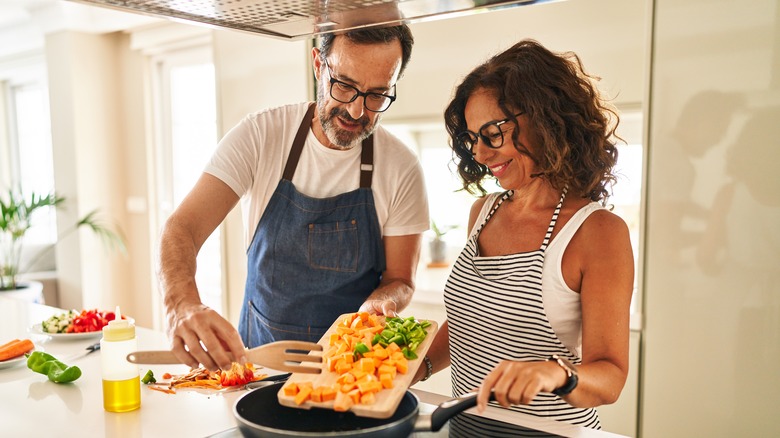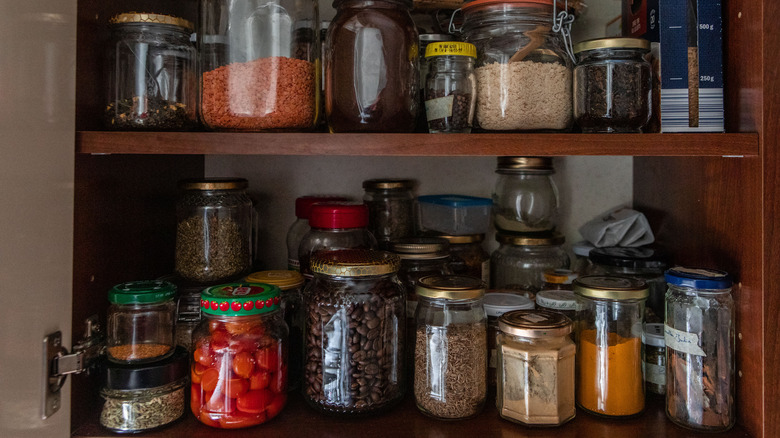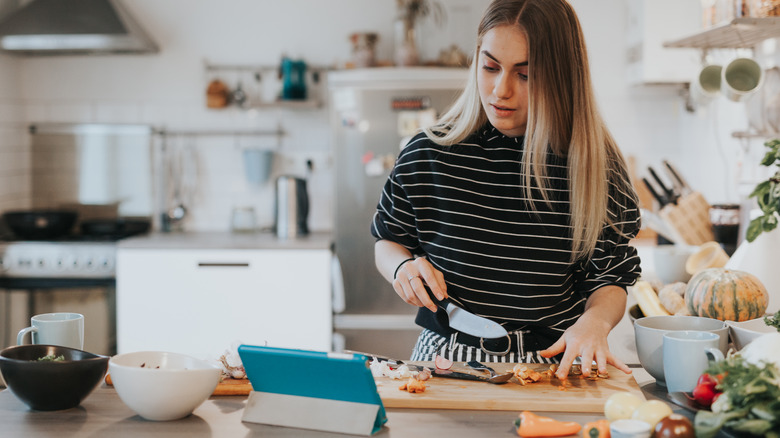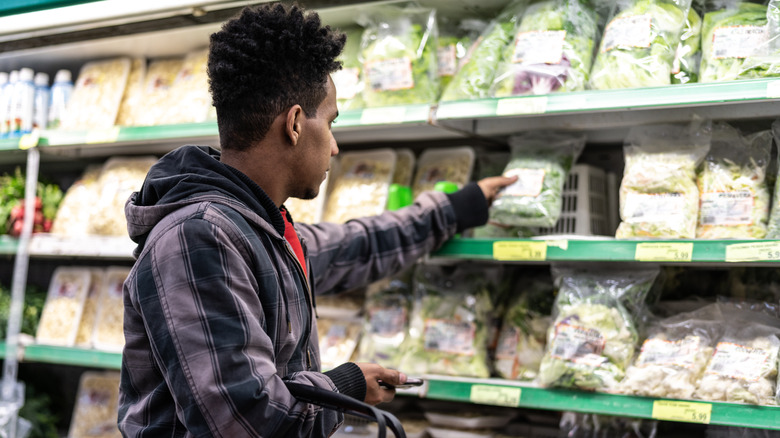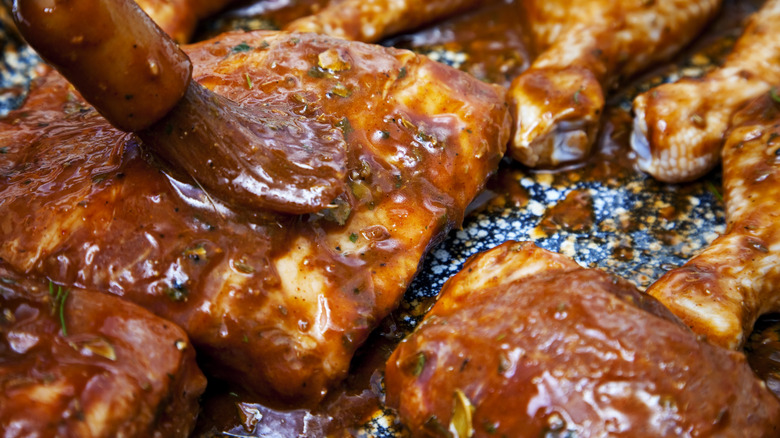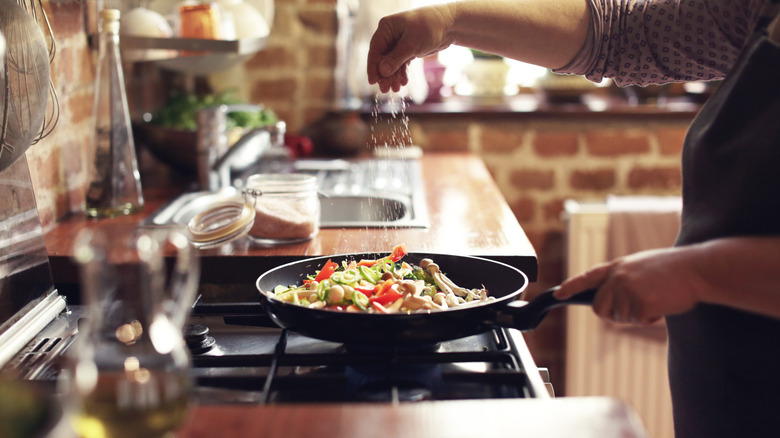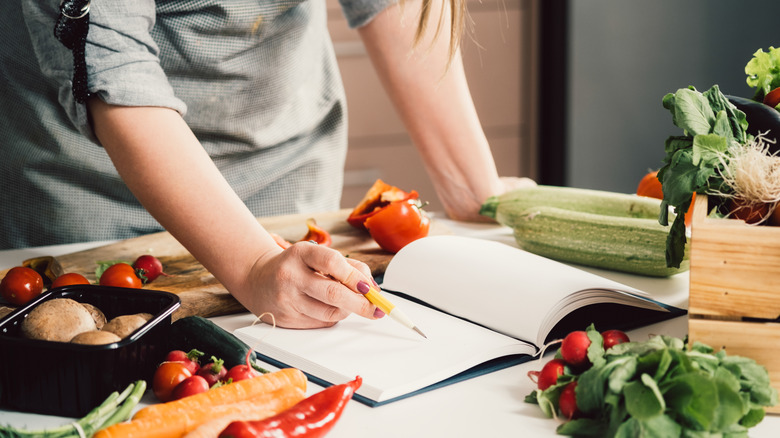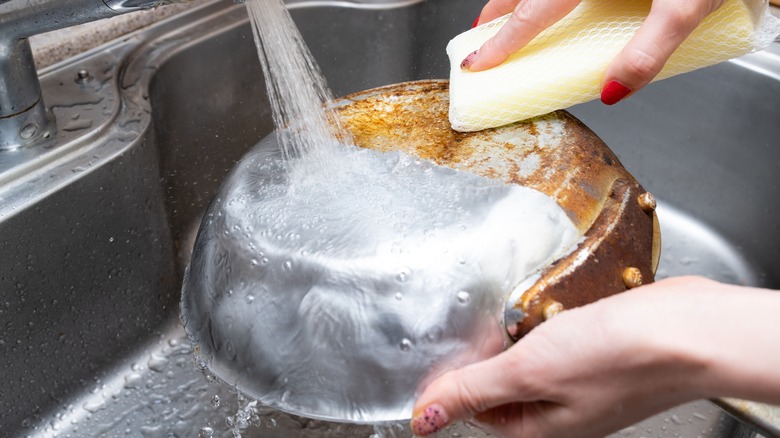10 Cooking Tips Beginners Need To Know
Cooking has the potential to be an anxiety-inducing task. While some use it for relaxation, others don't find it as calming. When you're new to cooking, it can be overwhelming. But with practice, it can become less stressful. Just as with any other skill, improving your cooking abilities takes time. But where does one start?
There are many things to learn in order to start making better meals and optimizing your time in the kitchen. You'll need to learn when to use recipes, what kitchen tools to purchase, how to season your food, and more. You should also learn how to pair main dishes with the right sides and cocktails. But of course, every personal cooking journey can be improved by getting to know your own taste. This is one of the most important pieces of advice we have to offer. As you develop your cooking skills, you should keep your own preferences in mind.
1. Learn to use seasonings
Learning how to properly season food is an important part of becoming a better cook. However, going to the seasoning aisle of your local grocery store can be shocking as they can contain so many spices and herbs that it's hard to know what to select. But if you have patience — and give seasoning your food some practice — you will improve.
Start by taking a closer look at the labels. If something interests you, research it online. However, there are a few basic seasoning ingredients that everyone should know. Salt will bring out the savory flavors of your food, while black pepper adds a mild hint of spice. If you want to turn up the heat even more, cayenne pepper is a common seasoning to use. When you're baking, you may find yourself using cinnamon to bring out the sweetness in certain recipes.
2. Follow recipes closely in the beginning
New cooks may need to follow a recipe every time they make a meal. During this process, they should follow the directions closely. This can be discouraging to some aspiring chefs, as cooking is often discussed as a mode of creative expression. Cooking doesn't always feel that creative when you're following someone else's directions.
But following these steps will help you learn important cooking skills, like mixing, seasoning, and measuring. After you gain more experience, you can then start to make small changes to the recipes you follow. These can be as small as using a different type of salt, or as drastic as using a different type of meat.
Even if you're more advanced, if you're making a meal for the first time, you should probably follow the recipe. But if you've already given it a first try, then feel free to push the boundaries of what is written in those step-by-step instructions. You may end up finding new flavors and ingredients to love.
3. Purchase the right kitchen tools
If you can think of something that needs to happen in the kitchen, there's a good chance a knick-knack exists for it. That's why having the right kitchen tools can make your job easier. Take the time to think about the meals you're planning to make and build the kitchen to help you reach that goal.
For example, do you plan to make daily smoothies for breakfast? Then you should invest in a durable blender that will hold up with frequent use. Are you frequently chopping fruit, vegetables, and meat? Then invest in a great set of knives and a quality cutting board. You can even purchase a knife sharpener.
Kitchen tools can quickly become expensive, so take some time to research the options available. Maintenance of your kitchen tools is also a key part of your growth as a cook. Take the time to clean and store your kitchenware properly. This will help your tools to last longer, thus helping you make the most of your purchases.
4. Use quality ingredients
It's important for cooks to use quality ingredients. Luckily, there are many different ways to identify first-rate foods. If you're looking for quality cuts of meat, talk to your local butcher. If you're looking for flavorful vegetables to add to a salad, speak with a vendor at your local farmer's market. You can also find resources on the subject, both online and in cookbooks. These sources can tell you what ingredients are best and how to identify them while shopping.
For many, the real challenge is getting your hands on these items. High-end goods are sometimes too expensive for home cooks to afford. In other cases, you could live in an area that lacks an abundance of grocery stores, or at least supermarkets that sell the items you're looking for. Despite all of these hurdles, obtaining quality ingredients is important. It will help your recipes taste so much better.
5. Measure everything
There are points in a recipe where it's especially important to stick to the instructions laid out for you. One such instance is when measuring your ingredients. This is especially imperative when adding seasoning; you can always add more seasoning to a meal, but you can't really ever take it out. Using measuring tools — like cups and scales — helps to ensure that this cooking step goes smoothly.
You can measure out your ingredients in advance, or as you go. However, if you're someone who gets anxious or overwhelmed during the middle of cooking a recipe, it can sometimes be more useful to measure out everything ahead of time. This way, you can simply pick up a container of your necessary ingredient, know that it already contains the correct amount, and quickly incorporate it into your recipe. But we recognize that there isn't always time to do this.
6. Brine and marinate
Marinating and brining are two useful techniques for making your food more flavorful and tender. Marinades can be purchased, but they are often made from scratch. Common marinade ingredients include oil, vinegar, and salt. To make a marinade, these ingredients are combined. Next, your meat (or whatever else needs marinating) is coated with or submerged in this marinade, then left to sit in it. Bringing meat is a very similar process, except the concoction is made mainly of water and salt.
Brining is mainly used to make meat more moist, whereas marinades are mainly used to add flavor. However, both tactics contribute a lot to your cooking. They allow your chosen spices, acidic ingredients, or simply salt to penetrate deeper into your ingredients, helping to produce a more satisfying outcome. While your meat is resting in the marinade or brine, just make sure the refrigerator is cool enough to protect bacteria from growing.
7. Try new things
As you develop your skills in the kitchen, it's important to expand your tastes. You can do so by cooking new meals, trying new techniques, or sampling new cuisines.
You don't have to make drastic changes to your diet. If you're allergic to shellfish, there's no need to find new ways to cook this type of seafood. But you can simply pick a category of food that you regularly consume and expand it. For example, if you love chicken and find yourself frequently making it, try making other types of poultry such as duck or quail. Sampling these will allow you to try something new, while also allowing you to experiment with cooking new recipes.
Aspiring cooks can also expand their horizons outside the home kitchen, by eating out. Of course, it's usually more expensive to eat out. However, you can then take inspiration from these dining experiences and try to recreate your favorite meals at home.
8. Pay attention to side dishes and drink pairings
When cooking, most focus on the entrée. As this dish is the main course, it makes sense to do so. But becoming a better cook also means paying attention to side dishes and drinks. These add an additional level of flare to the meal.
Side dishes can be used to complement flavors in your entrée. For example, rice is commonly served as a side dish for chicken. This pairing works because the rice helps to pick up your chicken's juices. Steak — often served with side dishes like potatoes — is a pairing that works the same way. Side dishes can also add complexity of flavor to your plate. If you serve a savory dish like baked chicken, you can round out the meal by adding some sweet potatoes.
Cocktails are another way to make something that pairs perfectly with dinner. The right drink can extend the flavors found in the meal or even bring out a different taste along the way. For example, gin-based drinks are frequently paired with seafood, while bourbon and barbecue are often paired together. Both pairings have similar flavors that are used to complement one another. Test which cocktails go well with your favorite meals.
9. Use cookbooks and take notes
Cookbooks are an important resource as you develop your skills. They not only show you how to make new recipes, but they can also introduce you to new tastes and cultures from around the world. As you develop your skills, add cookbooks you can read and use to your bookshelf. Choose ones that feature meals you want to try, or cuisines that you enjoy the most. You can even buy specific cookbooks, on topics like seafood, grilling, or making side dishes.
On top of buying the right cookbooks, you should also look at ways to add notes to the recipes you try. As you try new recipes, keep note of things that you found difficult to achieve, or things that you would do differently if you made the recipe again. Add your notes in the margins or in scraps of paper as a reminder. Some cookbooks even come with note pages.
10. Clean up as you go
Cooking can easily turn any kitchen into a mess. Once you are done enjoying a great meal that you spend your time putting together, it's easy to get crestfallen at the site of a kitchen filled with dirty dishes. The secret to beating that feeling and saving time is to clean up as you go.
Run warm water on items as you are done using them and stack them in the sink. When you place food in the oven or on the stove to cook, take advantage of that time to clean up the dishes and tools you are done using. Cleaning up along the way helps you save time that can become a hindrance at the end of cooking. This way, you don't have to rely on a dishwasher or leave dirty dishes in the sink for days — both of those can lead to problems down the line.
